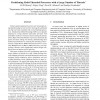Free Online Productivity Tools
i2Speak
i2Symbol
i2OCR
iTex2Img
iWeb2Print
iWeb2Shot
i2Type
iPdf2Split
iPdf2Merge
i2Bopomofo
i2Arabic
i2Style
i2Image
i2PDF
iLatex2Rtf
Sci2ools
154
click to vote
ISPASS
2005
IEEE
2005
IEEE
Partitioning Multi-Threaded Processors with a Large Number of Threads
Today’s general-purpose processors are increasingly using multithreading in order to better leverage the additional on-chip real estate available with each technology generation. Simultaneous Multi-Threading (SMT) was originally proposed as a large dynamic superscalar processor with monolithic hardware structures shared among all threads. Intel’s Hyper-Threaded Pentium 4 processor partitions the queue structures among two threads, demonstrating more balanced performance by reducing the hoarding of structures by a single thread. IBM’s Power5 processor is a 2-way Chip Multiprocessor (CMP) of SMT processors, each supporting 2 threads, which significantly reduces design complexity and can improve power efficiency. This paper examines processor partitioning options for larger numbers of threads on a chip. While growing transistor budgets permit four and eight-thread processors to be designed, design complexity, power dissipation, and wire scaling limitations create significant bar...
Related Content
| Added | 25 Jun 2010 |
| Updated | 25 Jun 2010 |
| Type | Conference |
| Year | 2005 |
| Where | ISPASS |
| Authors | Ali El-Moursy, Rajeev Garg, David H. Albonesi, Sandhya Dwarkadas |
Comments (0)

